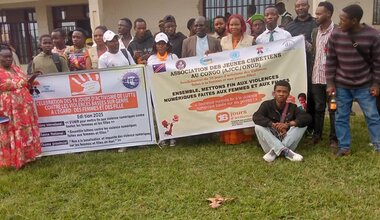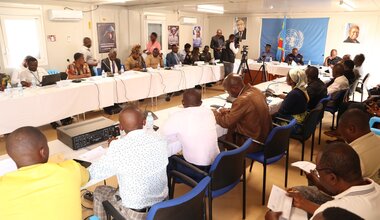South-Kivu: Mutarule mobile court hearing starting this coming Friday
Much to the delight of the victims, some of whom already started losing every hope to see justice done one day… as a result of the Congolese authorities’ determination with support from some DRC’s partners, including the United Nations.
Mutarule, 12 August 2016 – will the trial be held or not? This was the daily discussion every day in Mutarule, a territory situated about forty kilometers from Uvira in the South-Kivu Province. Between the threats on the witnesses and the delaying tactics by one another, between false disappearance of elements for the investigations and “unexplained” procrastinations, the trial on the Mutarule slaughter – the most recent killings having occurred in the night of 6 to 7 June 2014; the long-awaited trial will at last start on Friday, 12 August 2016 with the firm determination of the Congolese authorities and unfailing support (financial, logistic, technical…) from some DRC’s partners: the United Nations Joint Human Rights Office, MONUSCO (United Nations Stabilization Mission in DRC), the United Nations Development Program (UNDP), Search For Common Ground… NGO TRIAL.
This Friday 12 August 2016 will go down in the history books as a great day for the DRC, more particularly South-Kivu and Mutarule. “A great day”, highlighted a resident of Mutarule whose population massively came to witness the opening of the long-awaited trial. The launch of the mobile court hearing in Mutarule will stand as a proof of the Congolese authorities’ determination to fight impunity. “By organizing this hearing, notes a representative of the United Nations Joint Human Right Office MONUSCO-Uvira, we meant to send a strong signal: zero tolerance against impunity”. The trial that started this morning will last more than 4 weeks; say, from 12 August to 9 September. Altogether, 3 defendants (out of 7), including 2 FARDC officers and one civilian! “Three accused only”, said some people fearing that the true perpetrators of the Mutarule slaughters might have slipped through the nets of the Justice. They are prosecuted for having pushed the military personnel to commit unlawful acts contrary to the military code, and for committing war crime, murder, looting, rape, breach of physical integrity, attack against civilians, attacks on protected properties and destruction of properties. They were confronted with the 80 victims who survived the last massacres perpetrated from 6 to 7 June 2014. On that day at Katekama (Mutarule I), at 19h: members of a local church were assembled for Christmas vigil when they sustained heavy fire with machine guns and grenades.
Eye witnesses said 17 church members were shot down. Two women and one child were beaten by attackers in a health clinic. Other attackers broke into houses and killed three people with bayonets before burning them... Those attempting to flee from the attackers were killed at gun point, reported the same witnesses. Altogether, roughly thirty people (basically from the Bafuliru community) were killed, and one FARDC military personnel. More than 5000 people fled Mutarule, fearing for their security.
MONUSCO was on the spotlight, accused of having failed to respond on time to prevent the killing. Martin Kobler, former Special Representative of the United Nations Secretary General and chief of MONUSCO, in one of his visits to Mutarule during his tenure said in a few words: “we failed, it is a failure for MONUSCO,” before pledging “things will never be the same again;” he then instructed Mission’s force to act accordingly before asking questions (this was the famous Act, Don’t ask); for the purposes of ensuring a better protection of the civilian populations.
This deadly violence results from accumulated acts of violence going back to the colonial era.
The population of Mutarule expect a lot from this trial. They need to know those who masterminded the slaughters having disrupted the peace in the community. The leader of the Territorial Council of Uvira Youth, André Byadunia, hopes the trial “will contribute to restoring the broken confidence between the Bafuliru and the Barundi communities”. Etienne Togera, leader of the Youth of the Ruzizi Plains says that the population of Mutarule “wish to see those who committed the slaughter be identified and punished which will help calm down the minds and serve as an example to the rest of the DRC where similar killings are being committed… “. The outcome of the trial is highly expected by a population in thirst for a justice free from any tribal and community-based consideration.
Jean-Tobie Okala
Photos: Monusco/Jean-Tobie Okala
 UN
UN United Nations Peacekeeping
United Nations Peacekeeping






